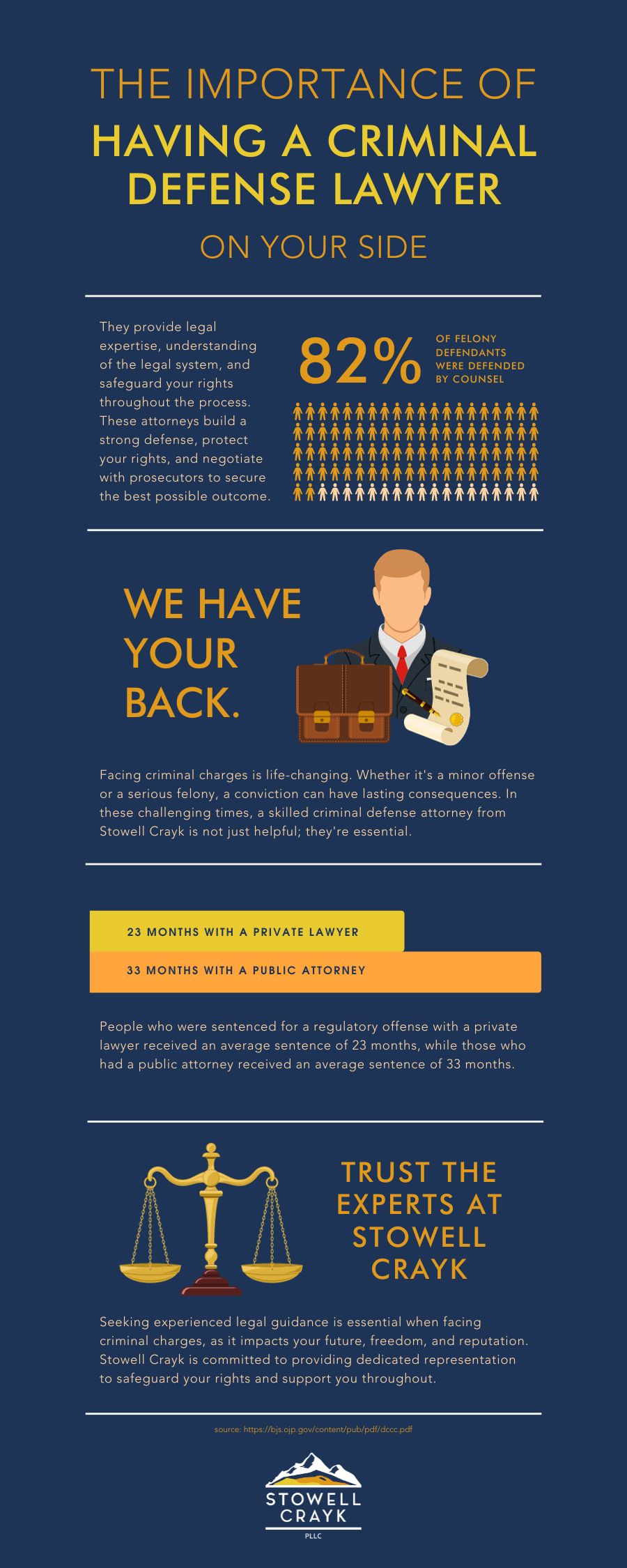Facing criminal charges is a daunting and life-altering experience. Whether you’re accused of a minor offense or a serious felony, the consequences of a conviction can be severe and long-lasting. In such trying times, having a skilled criminal defense attorney from Stowell Crayk by your side is not just advantageous; it’s essential. This blog post will delve into the crucial role that a knowledgeable criminal defense lawyer plays in protecting your rights, securing your future, and ensuring a fair legal process.
1. Legal Expertise and Understanding of the Legal System
Navigating the intricacies of the legal system can be a daunting task for anyone without legal training. A skilled attorney possesses a deep understanding of the law, criminal procedures, and the local legal landscape. They are equipped with the knowledge to:
- Assess the Strength of the Case: Your attorney will thoroughly analyze the evidence against you, identify weaknesses in the prosecution’s case, and determine the best defense strategy.
- Explain Your Rights: One of the first things a attorney will do is explain your rights and ensure they are protected throughout the legal process. This includes your right to remain silent, the right to an attorney, and the right to a fair trial.
- Navigate Complex Legal Procedures: Criminal cases involve a series of legal procedures, from bail hearings to plea negotiations and trial preparation. An experienced attorney will guide you through each step, ensuring that you are well-prepared and that your rights are upheld.
2. Building a Strong Defense
A critical aspect of a criminal defense attorney‘s role is building a strong defense tailored to the specifics of your case. This involves:
- Evidence Gathering: Your attorney will investigate the case, interview witnesses, review police reports, and gather evidence that supports your defense.
- Legal Strategy: Based on the evidence and circumstances of your case, your attorney will develop a strategic defense plan. This plan may include challenging the validity of evidence, questioning witness credibility, or arguing for a reduction of charges.
- Expert Witnesses: When necessary, your attorney can retain expert witnesses who can provide specialized knowledge and testimony to support your defense.
- Negotiating with Prosecutors: A skilled attorney can negotiate with prosecutors to seek a plea bargain that reduces charges or penalties, potentially avoiding a trial.
3. Protecting Your Rights
Perhaps one of the most critical roles of a criminal defense attorney is safeguarding your rights throughout the legal process. They will:
- Ensure Due Process: Your attorney will ensure that your rights to due process are upheld, meaning that you are treated fairly and that your case proceeds according to established legal procedures.
- Prevent Unlawful Searches and Seizures: If evidence was obtained through unlawful searches or seizures, your attorney can file motions to suppress that evidence.
- Challenge Evidence: Your attorney will scrutinize the prosecution’s evidence, looking for inconsistencies, inaccuracies, or violations of your rights.
- Represent You in Court: In the courtroom, your attorney will be your advocate, presenting your defense, cross-examining witnesses, and arguing on your behalf.
4. Negotiating with Prosecutors
In many criminal cases, negotiation with prosecutors is a crucial part of the process. An experienced attorney can negotiate with the prosecution to:
- Seek Reduced Charges: Negotiating for reduced charges can significantly impact the severity of potential penalties.
- Secure a Plea Bargain: A plea bargain can allow you to plead guilty to a lesser offense in exchange for reduced penalties, such as a shorter jail sentence or probation.
- Explore Alternative Sentencing: Your criminal defense attorney can explore alternatives to incarceration, such as community service, rehabilitation programs, or counseling, to provide a more constructive path forward.
5. Trial Advocacy
If your case goes to trial, having a skilled attorney becomes even more critical. They will:
- Present Your Case: Your attorney will present a compelling defense, challenging the prosecution’s evidence and presenting your side of the story to the judge or jury.
- Cross-Examine Witnesses: Skillful cross-examination can expose weaknesses in the prosecution’s case and raise doubts about witness credibility.
- Argue Legal Points: Your attorney will make legal arguments, citing precedent and applicable laws, to support your case.
- Protect Your Rights: In the courtroom, your attorney will ensure that your rights are upheld, preventing any legal misconduct or procedural errors that could impact the outcome.
6. Reducing Sentencing and Penalties
Even if you are found guilty, a skilled attorney can still play a crucial role in reducing your sentencing and penalties. They may:
- Present Mitigating Factors: Your attorney can present mitigating factors to the court, such as your remorse, cooperation, or evidence of rehabilitation, to secure a more lenient sentence.
- Advocate for Alternative Sentencing: Your attorney may recommend alternatives to incarceration, such as probation, drug treatment programs, or community service, depending on the circumstances.
7. Appeals and Post-Conviction Relief
If you are convicted and believe there were errors or misconduct during your trial, a skilled attorney can assist with the appeals process. They will:
- Review the Trial: Your attorney will thoroughly examine the trial proceedings for legal errors, procedural mistakes, or violations of your rights that may warrant an appeal.
- File Appeals: If there are legitimate grounds for appeal, your attorney will meticulously prepare and file the necessary legal documents to initiate the appeal process. They will also advocate on your behalf in appellate court, presenting arguments to challenge the conviction.
- Pursue Post-Conviction Relief: In some cases, post-conviction relief measures, such as habeas corpus petitions, may be pursued to challenge the legality of your imprisonment. Your attorney will explore these avenues to rectify any fundamental injustices that may have occurred during the trial or during your incarceration.
Navigating the appeals and post-conviction relief processes requires a deep understanding of criminal law and a keen eye for legal details. An experienced attorney can be your most valuable asset in seeking to overturn an unjust conviction and working towards a more favorable outcome.
Conclusion
Facing criminal charges is a harrowing experience, but having a skilled criminal defense attorney by your side can make all the difference. They will protect your rights, build a strong defense, and advocate for your best interests throughout the legal process. Whether negotiating with prosecutors, presenting your case in court, or pursuing appeals and post-conviction relief, their expertise is invaluable in securing the best possible outcome for your case.
If you or a loved one is facing criminal charges, don’t hesitate to seek the guidance of a dedicated and experienced attorney. Your future, freedom, and reputation are worth the investment in skilled legal representation. At Stowell Crayk, we are committed to providing the highest level of legal expertise and support to ensure that your rights are protected, and your defense is vigorous. Your future is our priority, and we’re here to help you every step of the way.

